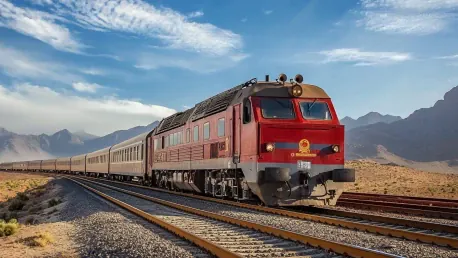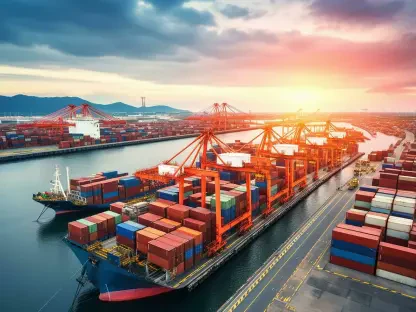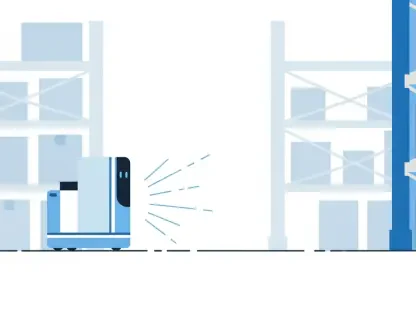Morocco’s rail infrastructure is set to undergo a monumental transformation, aiming to connect the northern city of Tangiers to the southern town of Lagouira. This ambitious project, spearheaded by the Moroccan Minister of Transport and Logistics, Abdel Samad Kayouh, is poised to expand the nation’s railway network and significantly impact economic and social development. By enhancing connectivity between major cities and regions, the Moroccan government envisions a future where efficient rail transport plays a central role in the nation’s growth.
A Strategic Vision for Connectivity
Linking Major Cities and Regions
The plan to expand Morocco’s national train network towards the south will link key cities such as Marrakech, Agadir, and Lagouira, ensuring comprehensive regional connectivity. This initiative involves constructing 1,300 kilometers of new high-speed lines and 3,800 kilometers of standard railway lines. The project includes an Atlantic axis that will connect Tangier to Agadir via important cities like Rabat, Casablanca, and Marrakech, as well as the Maghreb Corridor, which will link Casablanca with Oujda. The existing high-speed line from Tangier to Kenitra, already successfully operating, is an integral part of this larger endeavor, demonstrating Morocco’s commitment to advancing its rail infrastructure.
This strategic vision is not limited to just expanding the rail network within Morocco but also aims to position the country as a leader in rail transport across the African continent. By focusing on key corridors and high-speed lines, the Moroccan government looks to facilitate faster and more efficient travel, which is crucial for both passengers and freight services. This enhanced connectivity will contribute to economic development by enabling smoother movement of goods and people, thereby supporting trade and tourism. The project is a testament to Morocco’s forward-thinking approach to infrastructure development, which seeks to modernize transport facilities and improve overall mobility for its citizens.
Investment and Feasibility
The Moroccan government has allocated 857 million dirhams (approximately 81 million euros) for the feasibility study of the Kenitra-Marrakech segment, further extending the high-speed line to Agadir. This financial commitment underscores the nation’s dedication to this transformative project, ensuring that every aspect is meticulously planned and executed. The current success of the high-speed line from Tangier to Kenitra highlights the potential for further advancements, with significant reductions in travel time between Tangiers and Casablanca already achieved.
Investment in infrastructure is critical for long-term development, and Morocco’s substantial allocation for this project reflects its strategic importance. The feasibility study for the Kenitra-Marrakech segment will provide detailed insights into the technical and financial requirements, helping to mitigate risks and ensure successful implementation. By extending the high-speed line to Agadir, Morocco aims to create a seamless travel experience across key cities, fostering economic growth and regional integration. The government’s proactive approach to securing funds and conducting thorough studies illustrates its commitment to building a robust and sustainable rail network that meets future demands.
Comprehensive National Network
The Morocco 2040 Railway Plan
Morocco leads the African continent in rail transport networks, particularly with its high-speed lines. The Morocco 2040 Railway Plan, developed by the National Railways Office (ONCF), focuses on connecting key cities, modernizing train services, and promoting economic mobility within the nation and beyond. King Mohammed VI emphasized the importance of this network in unifying Morocco and linking it to the rest of Africa. The Marrakesh-Lagouira line is a significant component of this plan, contingent upon securing the necessary financial resources to complete it.
The ONCF’s vision for the Morocco 2040 Railway Plan includes expanding the high-speed line network from the current 322 kilometers to an impressive 1,300 kilometers by 2040. This ambitious project aims to serve 43 cities, covering 90% of the population compared to the current reach of just over 50%. Connections to 12 ports and 15 international airports are integral to this comprehensive plan, enhancing both domestic and international travel. By prioritizing rail infrastructure, Morocco is laying the groundwork for sustained economic growth and improved transportation options, positioning itself as a key player in the African rail transport sector.
Socioeconomic Impact and Employment
The Moroccan authorities estimate that the national railway expansion project will create 300,000 jobs across the country. This significant employment boost highlights the project’s potential to drive socioeconomic development and improve livelihoods. The plan’s positive impact extends to Western Sahara, a region Morocco claims as its southern provinces, offering broad autonomy under Moroccan sovereignty.
Beyond job creation, the railway expansion is expected to enhance regional development by improving access to education, healthcare, and other essential services. The increased connectivity will facilitate smoother movement of goods, boosting trade and investment opportunities. Moreover, by integrating Western Sahara into the national rail network, Morocco aims to promote stability and economic growth in the region. The comprehensive approach to expanding rail infrastructure demonstrates Morocco’s commitment to inclusive growth and regional integration, ensuring that all areas of the country benefit from improved transportation networks.
Future Prospects and Integration
Infrastructure Modernization
Morocco’s railway expansion project exemplifies a forward-looking vision for national connectivity and socioeconomic development. The cohesive strategy aligns with long-term plans for significant events such as the 2030 World Cup, which Morocco will co-host, emphasizing the necessity of substantial transport networks to facilitate movement and connectivity. This project is an essential part of Morocco’s plans to modernize its infrastructure and deepen engagement with the African continent, despite the financial and logistical challenges it faces.
Morocco’s sincere commitment to enhancing its transportation infrastructure reflects a broader goal of fostering regional cooperation and connectivity. By investing in modern rail networks, the nation is poised to reap numerous benefits, including increased economic growth, tourism, and social development. The successful execution of this project will not only transform Morocco’s transportation landscape but also enhance its reputation as a forward-thinking leader in infrastructure development. As the country continues to push forward with its ambitious plans, the positive impacts of improved rail connectivity are expected to resonate throughout the region and beyond.
Looking Forward
Morocco’s rail infrastructure is set for a groundbreaking transformation with plans to connect the northern city of Tangiers to the southern town of Lagouira. This bold initiative, led by Moroccan Minister of Transport and Logistics, Abdel Samad Kayouh, aims to extend the country’s railway network and significantly boost economic and social growth. By improving connectivity between key cities and regions, the Moroccan government envisions a future where efficient rail transport becomes a cornerstone of the nation’s development.
The ambitious project is expected to not only facilitate the movement of people but also enhance trade and tourism. With better rail links, there will be more opportunities for businesses to expand and for communities to benefit from easier access to markets and services. Furthermore, the increased mobility can help reduce regional disparities and promote a more balanced development across the country. By investing in this critical infrastructure, Morocco is taking a significant step toward a more integrated and prosperous future.









